人教版选修6unit2Using language
高二英语人教版选修6课件:Unit 2 Language points
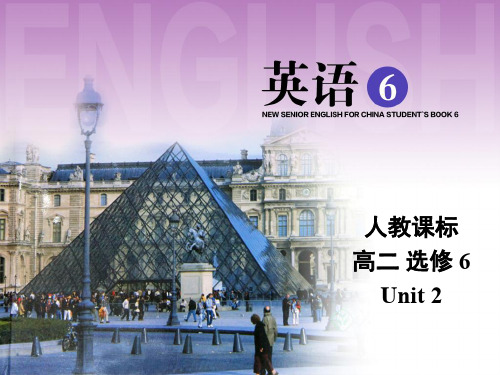
1) 汽油快用完了。 The petrol _i_s_r_u_n_n_i_n_g_o_u__t _.
2) 我们剩下的时间不多了。 We are _r_u_n_n_i_n_g_o_u__t _o_f our time.
2. Max knows how to convey a message to his audience. Max知道如何向观众传达信息。
2) emotion 情绪 emotional 易动感情的
kinds of feelings:
忧伤 sorrow
幸福 happiness
sadness
爱 love
an uncountable noun.
2. Others try to convey certain emotions. 1) convey ★ 作“传达,表达(思想或感情等)” 讲时,常用于convey sth. (to sb.)结构。 e.g. 1. Colours like red convey a sense of energy and strength. 2. Please convey my thanks to your wife.
2) if引导的虚拟条件句与过去事实相反, 从句谓语动词用“had+过去分词”, 主句谓语动词用“would / should / could / might + have +过去分词”。
【考例1】 Thank you for all your hard work last week. I don’t think we ______ it without you. A. can manage B. could have managed C. could manage D. can have managed
人教版高中英语选修六Unit2 Using Language 课件

Try creating your own images
When you are feeling extremely happy, what images can be used to express it?
The third strophe
1. What does the age “nineteen” mean? It means being grown-up/ an adult. 2. When does the writer keep his child’s smiles? He keeps the smiles before the child becomes an adult.
warmth
Winter mornings/ cold snow
the explanation
I will give you wa_r_m__t_h_ which I have s_a_v_e_d_ when you feel c_o_ld_.
Imagery appreciation
The second strophe
Discussion
2. Who is the speaker in the poem and who is he /she speaking to? The writer may be a parent, and he/ she is speaking to his/ her child.
Does a poet express his/ her feelings directly?
Kind of feelings friendship
高二英语人教版选修6课件:Unit 2 Learning about language
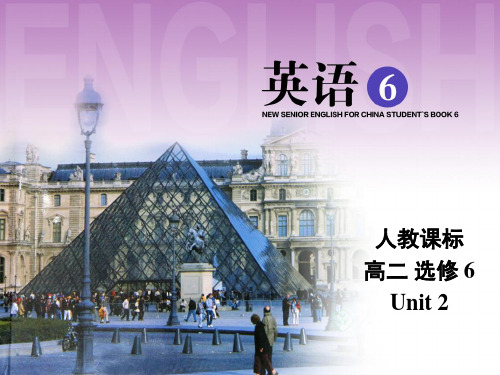
When I _r_a_n_o_u_t__o_f_ new poems to read and enjoy, I would go to the library for some more. The librarian was a friend of my mother, and she would put poetry books on one side for me. In fact, my family love reading so much that we keep buying books. Now the living room of our _c_o_t_t_a_g_e_ is full of books.
Review these useful words and expressions.
3. Without your help, we _____ so much.
1. A. won’t achieve 2. B. didn’t achieve
C. don’t achieve D. wouldn’t have achieved
II. 用所给词或短语的适当形式完成下面 短文。
Rick forgot to take his notebook home yesterday. He really wishes he _h_a_d_r_e_m__e_m_b_e_r_e_d_ (remember) it. If he _h_a_d_r_e_m__e_m_b_e_r_e_d_ (remember) it, he w__o_u_ld__h_a_v_e__b_e_en__a_b_l_e_t_o_ (be able to)
3. Look at the two meanings for the words below. Choose the meaning that was used in the reading passage. Then make up a sentence with the words having the same meaning.
【公开课】Unit+2+Using+language课件人教版(2019)选择性必修第二册

should consider the
This life-changing
disadvantபைடு நூலகம்ges
experience is worthwhile
Letter from Zhang Yi
Main point The advantages are greater.
Re添as加o标n 题1 The first advantage....personalgrowth.
首先,许多留学生面临着巨大的经济压力,这意味着并非每个人都能出
国留学。国外的学费和生活开销比国内昂贵得多,大部分家庭最终可能 要花费一大笔钱。而在中国读书则更加方便,而且省钱。
to begin with 首先 拓展:to start with;first of all ;in the first place
添加标题
请在此添加您的文字内容,请在此添加您的文字内容。 请在此添加您的文字内容
Activity 1
Paragraph Argument 添加标题chain
1 请在此添加您的文I字n内tr容oducing 请在此添加您的th文e topic
Main point
Letter 1 (Body part) Letter 2 (Body part)
To begin with, many students who study abroad face great economic pressure. That means studying abroad is just not possible for everyone. Tuition fees and living expenses are much more expensive than at home and could end up costing most families an arm and a leg. Studying in China is much more convenient and can help save money.
(人教版)高中英语必修二学案:Unit 2 Using Language (含答案)
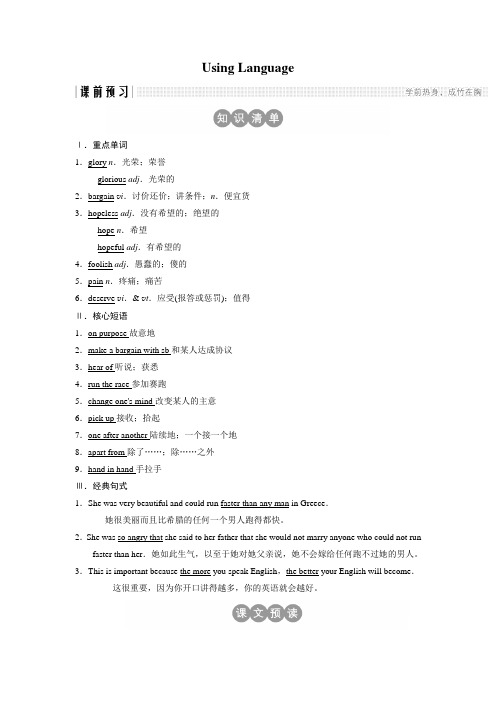
Using LanguageⅠ.重点单词1.glory n.光荣;荣誉glorious adj.光荣的2.bargain v i.讨价还价;讲条件;n.便宜货3.hopeless adj.没有希望的;绝望的hope n.希望hopeful adj.有希望的4.foolish adj.愚蠢的;傻的5.pain n.疼痛;痛苦6.deserve v i.& v t.应受(报答或惩罚);值得Ⅱ.核心短语1.on purpose故意地2.make a bargain with sb和某人达成协议3.hear of听说;获悉4.run the race参加赛跑5.change one's mind改变某人的主意6.pick up接收;拾起7.one after another陆续地;一个接一个地8.apart from除了……;除……之外9.hand in hand手拉手Ⅲ.经典句式1.She was very beautiful and could run faster than any man in Greece.她很美丽而且比希腊的任何一个男人跑得都快。
2.She was so angry that she said to her father that she would not marry anyone who could not run faster than her.她如此生气,以至于她对她父亲说,她不会嫁给任何跑不过她的男人。
3.This is important because the more you speak English,the better your English will become.这很重要,因为你开口讲得越多,你的英语就会越好。
阅读清障①Atlanta/ət'læntə/n②princess/pr I n'ses/n.公主③glory/'ɡl rI/n.光荣;荣誉win glory for为……赢得荣誉④would是情态动词,表示“会,将会”※who引导的定语从句,修饰先行词anyone。
人教版选修6unit2Using_language

Translate the poem into Chinese.
And for myself I’ve kept your smile
When you were but nineteen, Till you’re older you’ll not know What brave young smiles can mean.
I know no answers To help you on your way The answers lie somewhere At the bottom of the day.
b. Does the poem have a rhythmic pattern? Yes, it has two strong beats per line.
c. Does the poem have rhyming words? Yes.
d. When you were listening to the poem, did it make you feel something or think about something ? What did it make you feel or think about? Students’ own answer.
In what aspects can we appreciate poems?
1. Rhythm, rhymes 2. Emotions 3. Image (意象)
高中英语Unit2LearningTip课后篇巩固提升含解析新人教版选修6
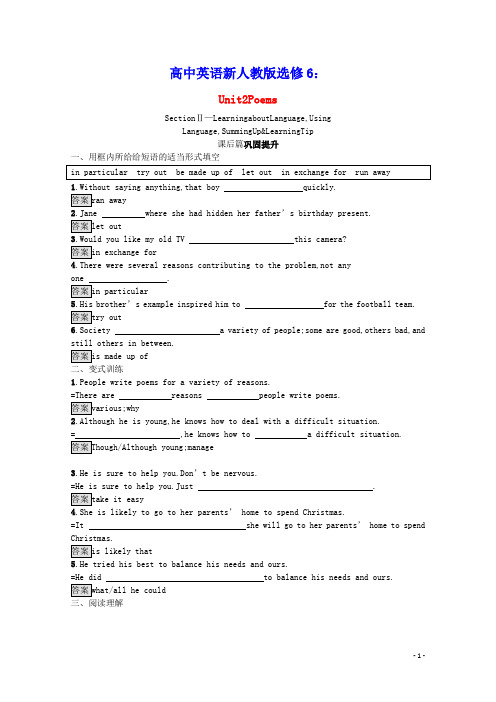
高中英语新人教版选修6:Unit2PoemsSectionⅡ—LearningaboutLanguage,UsingLanguage,SummingUp&LearningTip课后篇巩固提升一、用框内所给给短语的适当形式填空1.Without saying anything,that boy quickly.2.Jane where she had hidden her father’s birthday present.3.Would you like my old TV this camera?4.There were several reasons contributing to the problem,not any5.His brother’s example inspired him to for the football team.6.Society a variety of people;some are good,others bad,and still others in between.二、变式训练1.People write poems for a variety of reasons.=There are reasons people write poems.2.Although he is young,he knows how to deal with a difficult situation.,he knows how to a difficult situation.3.He is sure to help you.Don’t be nervous.=He is sure to help you.Just .4.She is likely to go to her parents’ home to spend Christmas.=It she will go to her parents’ home to spend Christmas.5.He tried his best to balance his needs and ours.=He did to balance his needs and ours.三、阅读理解My motivation for starting our family tradition of reading in the car was purely selfish:I could not bear listening to a song for another 10 hours.My three children had been addicted to this cassette on our previous summer’s road trip.As I began to prepare for our next 500-mile car trip,I came across a book—Jim Trelease’s TheRead-AloudHandbook.This could be the answer to my problem,I thought.So I put Roald Dahl’s JamesandtheGiantPeach into my bag.When I began to read aloud the tale of the boy who escapes the bad guys by hiding inside a giant peach,my three kids argued and wrestled in their seats.But after several lines,they were attracted into the rhythm of the words and began to listen.We soon learned that the simple pleasure of listening to a well-written book makes the long miles pass more quickly.Sometimes the books we read became highlights(最精彩的部分) of the trip.I read Wilson Rawls’s SummeroftheMonkeys as we spent two days driving to the beach.We arrived just behind the power crews restoring (恢复) electricity after a storm.The rain continued most of the week,and the beach was covered with oil washed up by the storm.When we returned home,I asked my son what he liked about the trip.He answ ered without hesitation,“The book you read in the car.”Road trips still offer challenges,even though my children now are teenagers.But we continue to read as we roll across the country.And I am beginning to see that reading aloud has done more than help pass the time.For at least a little while,we are not shut in our own electronic worlds.And maybe we’ve started something that will be passed on to the next generation.1.Why did the author start reading in the car?A.She wanted to have a better journey.B.She wanted to keep a family tradition.C.Her children were addicted to reading.D.Her children were tired of the cassette.“Icouldnotbearlisteningtoasongforanother10hours”可知,作者无法忍受再听同一首歌10小时了。
英语人教版高中选择性必修二教案Unit 2 Using Language第1课时 教案
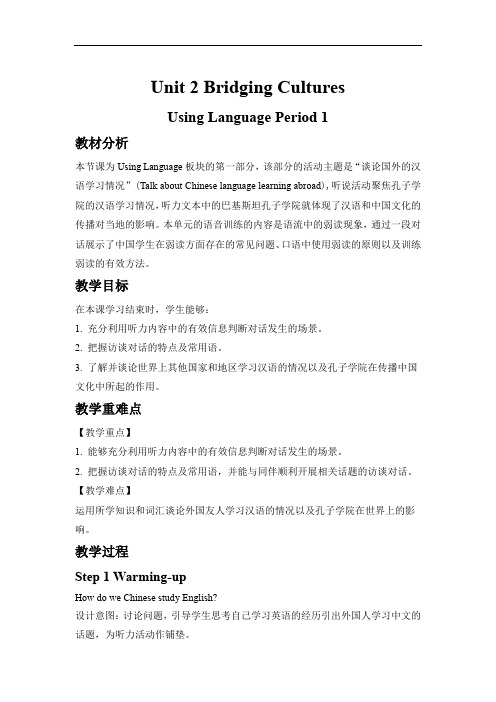
Unit 2 Bridging CulturesUsing Language Period 1教材分析本节课为Using Language板块的第一部分,该部分的活动主题是“谈论国外的汉语学习情况”(Talk about Chinese language learning abroad),听说活动聚焦孔子学院的汉语学习情况,听力文本中的巴基斯坦孔子学院就体现了汉语和中国文化的传播对当地的影响。
本单元的语音训练的内容是语流中的弱读现象,通过一段对话展示了中国学生在弱读方面存在的常见问题、口语中使用弱读的原则以及训练弱读的有效方法。
教学目标在本课学习结束时,学生能够:1. 充分利用听力内容中的有效信息判断对话发生的场景。
2. 把握访谈对话的特点及常用语。
3. 了解并谈论世界上其他国家和地区学习汉语的情况以及孔子学院在传播中国文化中所起的作用。
教学重难点【教学重点】1. 能够充分利用听力内容中的有效信息判断对话发生的场景。
2. 把握访谈对话的特点及常用语,并能与同伴顺利开展相关话题的访谈对话。
【教学难点】运用所学知识和词汇谈论外国友人学习汉语的情况以及孔子学院在世界上的影响。
教学过程Step 1 Warming-upHow do we Chinese study English?设计意图:讨论问题,引导学生思考自己学习英语的经历引出外国人学习中文的话题,为听力活动作铺垫。
Step 2 Pre-Listening1.Discuss the two questions with your partner.(1) What do you know about Chinese language learning abroad?(2) How do people from other countries get to know Chinese culture?设计意图:引导学生就世界上其他国家和地区学习汉语的情况展开讨论,激活学生的背景知识。
- 1、下载文档前请自行甄别文档内容的完整性,平台不提供额外的编辑、内容补充、找答案等附加服务。
- 2、"仅部分预览"的文档,不可在线预览部分如存在完整性等问题,可反馈申请退款(可完整预览的文档不适用该条件!)。
- 3、如文档侵犯您的权益,请联系客服反馈,我们会尽快为您处理(人工客服工作时间:9:00-18:30)。
admired. 他模仿一个他钦佩的人。
2. hold on
They managed to hold on until help arrived. 他们设法坚持住直到有救援到来。 Hold on to your glass, Bob! 使劲抓住你的杯子, 鲍勃! 知识拓展 阻挡, 抑制 hold back _____________ 压制, 限制 hold down _____________ 大发议论, 夸夸其谈 hold forth _________________ 紧紧抓住不放 , 保住 hold onto _________________ 坚持, 信守, 忠于 hold to _________________ 推迟, 使耽搁 hold sth./ sb. up __________________
2. Try beating or clapping the strong beats of the rhythm as you read the poem to yourself. Now listen to the poem again and clap the strong beats.
I‟ve saved the summer And I give it all to you To hold on winter mornings When the snow is new. 我将所珍藏的夏季 全部都送去给你 待到冬日的初雪纷然降临时 来将清晨那一刻的璀璨留住
B. Although the future may be difficult for you, whatever you need warmth and love, remember I’ll have some to give you. C. While you’re away I’ll remember your smile and I’ll love you always. When you return, I hope you will love me.
3. Till you‟re older you‟ll not know what brave young smiles can mean. 等你长大成人以后, 才知道年轻勇敢的微 笑的奥秘。 [点拨] till用在肯定句中, 意为“直到…… 为止”, 通常表示动作的终点, 因此, 动词 必须是延续性的。如: We must stick to our task till it is finished. 我们必须继续工作, 直到做完为止。
2 Now read “I‟ve saved the summer”. 1. Circle the words that rhyme. What is unusual about the rhyming words in the last four lines? You/new; need/feed; nineteen/mean; way/ day; own/own. The rhyming words in the last four lines are unusual because they are the same word although they each have a different meanings.
The beautiful scenery _____________________. inspired the composer
美丽的景色使作曲家灵思泉涌。
The sound of martial music _________________. is always inspiring
军乐声总是令人振奋的。
inspired us to try again His speech __________________________. 他的演讲鼓舞了我们再作尝试。
His encouraging remarks ___________________ inspired confidence in
me.
他的一番鼓励激起了我的信心。
But if you‟ve a need for love I‟ll give you all I own It might help you down the road Till you‟ve found your own. 但是只要你需要 我会倾尽我所有的爱 它或许可以帮你踏上旅程 直到你最终找到属于自己的爱
Discussion
1. Who is the speaker in the poem and who is he /she speaking to ? Give reasons to support your answer. A parent (mother or father) speaking to a young adult child.
4. try out: trying something to find out about it 试用, 试验
Please try out red wine. 请试试我们的红葡萄酒。 His brother‟s example inspired him to try out for the football team. 他哥哥的榜样激励他去
高二人教新课标版选修六
Unit 2 Poems
Using language
Rod Mckuen is an American poem, singer, songwriter and musician. “I’ve saved the summer” is his last work.
1 Listen to the poem „I’ve saved the summer‟ and answer these questions. 1. Do you think the speaker in the poem is more likely to be a girlfriend / boyfriend or parent? a parent. 2. Does the poem have a rhythmic pattern? Yes, it has two strong beats per line.
Just wait till you see it. It‟s great. 你就等着直到看见它吧, 好看极了。 用在否定句中, 意为“直到……才”, 通常表 示动作的起点, 动词可以是延续性的也可以是 非延续性的。如: She didn‟t sleep till her son came back. 直到她儿子回来她才睡着。 (sleep为延续性动词) I didn‟t begin work till he had gone. 直到他走了我才开始工作。 (begin为非延续性动词)
Language Points
1. Does the poem have a rhythmic
pattern?
pattern: n. (1) 图案 This cloth has a pattern of blue and white squares. 这种布有蓝白格子的图案。
(2)模式, 方式, 形式
4. inspire vt.
① 鼓舞, 激励, 驱使(+to) inspire sb. to do sth. 鼓舞某人做某事 His noble example inspired the rest of us to greater efforts. 他那高尚的榜样激发我们大家更加努力。 ②赋予...灵感, 给...以启示 inspire sb. 赋予某人灵感 His best music was inspired by the memory of his mother. 最好的乐曲创作灵感来自怀念他的母亲。
接受足球队的选拔测试。
2. Which of the following is the closest to the speaker‟s message? Give a reason for your choice. B A. If it’s cold, I’ll warm you; if it’s dark, I’ll give you light; if you’re hungry, I’ll feed you; if you want to love, I’ll give it to you.
③激起, 唤起(感情, 思想等)
inspire sth. in sb. 使某人产生某种感情;
激发某人的某种感情
inspire sb. with sth.
使某人产生某种感情; 激发某人的某种感情
inspired
inspiring
adj. 受到鼓舞的
adj. 令人振奋的
inspiration n. 灵感
仅仅在你十九岁时 你的微笑便牢牢占据在我的记忆里 当你长大后你便会知道 年轻灿烂的微笑的奥秘
I know no answers To help you on your way The answers lie somewhere At the bottom of the day. 我不知晓有什么妙计 能帮你解决人生道路上的难题 答案也许就在那里 当夕阳褪尽夜色降临
The illness is not following its usual
pattern. Does the poem have a rhythmic pattern? (3)模范; 榜样 The company set a pattern for others to follow. v. form a pattern He patterned himself upon a man he
பைடு நூலகம்
I‟ve saved some sunlight If you should ever need A place away from darkness Where your mind can feed. 我将所珍藏的阳光 全部都存留给你 让你在一个远离黑暗的地方 用温暖填满自己澄澈的心灵
